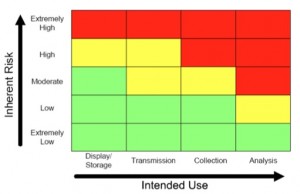
Source: mHealth Regulatory Coalition FDA Report
Last week six members of the US House of Representatives Committee on Energy and Commerce wrote a letter to FDA Commissioner Margaret Hamburg MD to ask her when the agency expects to publish its final guidelines for how and when it regulates mobile medical apps as medical devices. The FDA draft guidance document on mobile medical apps was published for public comment in July 2011. The letter also asks whether the FDA will consider the "actual use" of a mobile medical app in addition to the "intended use" when making its determination about whether an app needs to go through the 510(K) process. Finally, the letter closes with a series of questions related to the final guidance document and the committee wants answers by March 15th.
The letter is signed by Rep. Fred Upton (R-MI), Rep. Tim Murphy (R-PA), Rep. Marsha Blackburn (R-TN), Rep. Michael Burgess (R-TX), Rep. Joe Barton (R-TX), and Rep. Greg Walden (R-OR).
Almost a year ago a similar group of legislators -- also six Republicans -- sent a somewhat similar letter to the FDA about the mobile medical apps guidance document. In April 2012 ix Republicans in the US House of Representatives sent a letter to the FDA and FCC that explained the importance of wireless health devices and medical apps, cautioned against slow and inconsistent regulations, and asked for a progress report on how the two regulatory bodies were working together to co-regulate these technologies. That letter -- like the latest one -- was signed by Blackburn, Walden and Burgess, and a few others.
While the questions posed in the newest congressional missive to the FDA might be the most interesting, the section about how the FDA may treat "actual" vs. "intended" use in its decision-making was a new thread. Here's the relevant passage from the letter:
"Since the July 2011 guidance, the FDA has held a public workshop on mobile medical apps and received many public comments but has not yet issues final guidance. Although FDA's announcement on medical applications focused on the 'intended use' of the application when determining whether it should be regulated as a medical device, we are concerned about the potential of 'actual use' becoming a factor in the future. Last year Members on this Committee wrote to you because draft guidance issued by the FDA on Commercially Distributed in Vitro Diagnostic Products indicated that 'actual use' would be a factor in your analysis of 'intended use'. If FDA decides to take a similar approach in its final guidance with medical applications, this could affect the growth and innovation in this market."
The letter also points out that if medical apps are regulated as FDA cleared medical devices, then "it raises the possibility that they would also be subject to new taxes" under the health reform legislation. It's curious that the legislators don't know this for certain, they believe it's still just a possibility.
The legislators asked the FDA to answer these four questions by March 15th. MobiHealthNews has answered a few of these already:
1. When will the FDA issue final or updated guidance with respect to the July 19, 2011, request for input on its oversight approach for mobile medical applications designed for use on smartphone or other mobile computing devices?
2. Has the FDA discussed, prepared, or analyzed the effect of the medical device tax on smartphones (as well as tablets or similar devices) or the creators or distributors of applications for those products? If so, please provide all documents analyzing or relating this issue.
3. Will the actual use of a smartphone, tablet, or app be a factor in whether the FDA chooses to regulate the device or app as a medical device? Has it been a factor in any analysis by FDA already completed?
4. How many mobile medical apps have sought approval from the FDA before entering the market? What was the processing time for each of these apps? How many mobile medical apps have been subject to oversight by the FDA after introduction to the market? How many apps have either been changed or removed from the market by FDA oversight, and why?
MobiHealthNews' recent report on FDA cleared apps answers some of the questions posed in the fourth question. For example, there are at least 76 510(k) cleared medical devices that would qualify as mobile medical apps based on the FDA's definition of "mobile platform" and "app".


















